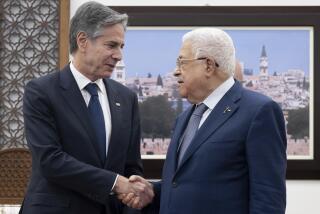U.S. Envoy Says Palestinian Forces Unprepared for Pullout
- Share via
WASHINGTON — Just six weeks before Israel is due to evacuate its Gaza Strip settlements, the U.S. general charged with reforming the Palestinian security forces said Thursday that they were not yet ready to enforce internal security or prevent attacks on Israeli targets.
In his first extensive public comments since he began his efforts more than three months ago, Army Lt. Gen. William Ward said the Palestinians had not yet forged their disparate security groups into a single force under a centralized command.
The Palestinian Authority has cut the number of security organizations from more than a dozen to six, but needs to bring that number down to three, he said in a hearing of the Senate Foreign Relations Committee.
Asked whether he thought the Palestinians were capable of enforcing the law and suppressing attacks on Israel, Ward responded, “The ability will come after time, ... it does not currently exist.”
Ward’s testimony came as the Bush administration stepped up its efforts to ensure that Israel’s planned mid-August withdrawal of its forces and settlers from Gaza, which it has occupied since the 1967 Middle East War, would not create a security vacuum.
The administration recently expanded Ward’s responsibilities to include mediation between Israel and the Palestinians on the withdrawal. And Secretary of State Condoleezza Rice traveled to the region in June to encourage greater cooperation between Israel and the Palestinian Authority.
Ward testified along with David Welch, assistant secretary of State for Near East affairs, and James Wolfensohn, an envoy to Israel and the Palestinians on the withdrawal. Wolfensohn, the former World Bank president, represents the United States, Russia, the European Union and the United Nations.
“I can say that I am more optimistic now than I was just a month ago,” that Israel’s withdrawal from Gaza may give fresh impetus to the quest for a permanent two-state settlement of the Israeli-Palestinian conflict, Wolfensohn said.
He said Israel and Palestinian officials recently agreed on six issues they would negotiate to ensure a smooth hand-over. But Welch said the administration wanted to see more coordination between the parties. He also warned that Syria continued to support “Palestinian extremist groups” in an “attempt to block the Israeli and Palestinian desire to achieve peace.”
The administration is “deeply concerned about the fact that certain Palestinian extremist groups have offices and headquarters in Damascus,” Welch said.
“And under the circumstances, I think that is a dangerous indication of Syrian support for the activities of these groups.”
The administration also has “a number of concerns,” Welch said, about Israeli settlement activity in the West Bank.
He said the administration remained concerned about Israel’s “confiscation” of Palestinian land and its ongoing construction of a “security barrier” in and around the West Bank. Welch added that although Israel had promised to dismantle illegal settlements in the West Bank, it had not yet done so.
Ward offered by far the most blunt assessment of the situation on the ground.
He depicted a Palestinian force that is woefully unprepared to handle internal policing duties or stop attacks on Israel after Israeli forces retreat from Gaza.
The Palestinian security force has more than 58,000 members, Ward said, but no more than 22,000 “actually show up for work.”
He said the force was like “a social welfare net,” with the payroll including officers who do not “contribute to the day-to-day security situation on the Palestinian street.”
Ward described the difficult task of remaking a force still composed of units with “loyalty to individuals, chieftains, fiefdoms” into one that “is responsive to a central authority with direct responsiveness and responsibility back to the central governing bodies.”
“That has not taken hold.”
More to Read
Get the L.A. Times Politics newsletter
Deeply reported insights into legislation, politics and policy from Sacramento, Washington and beyond. In your inbox twice per week.
You may occasionally receive promotional content from the Los Angeles Times.










